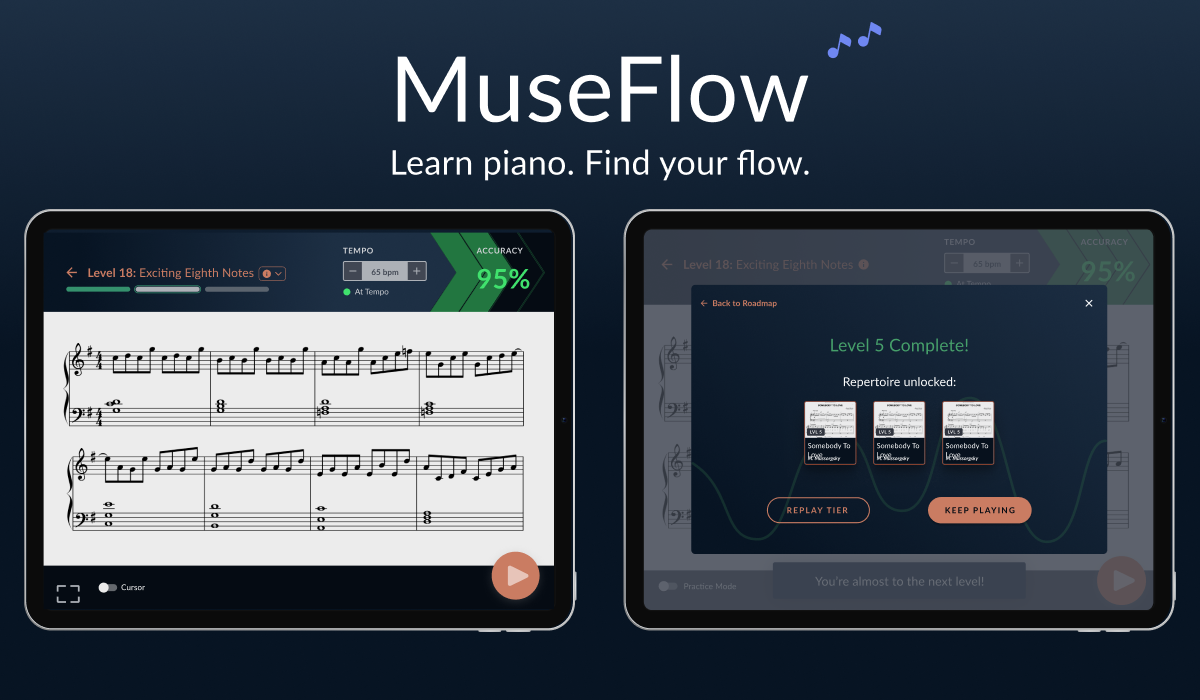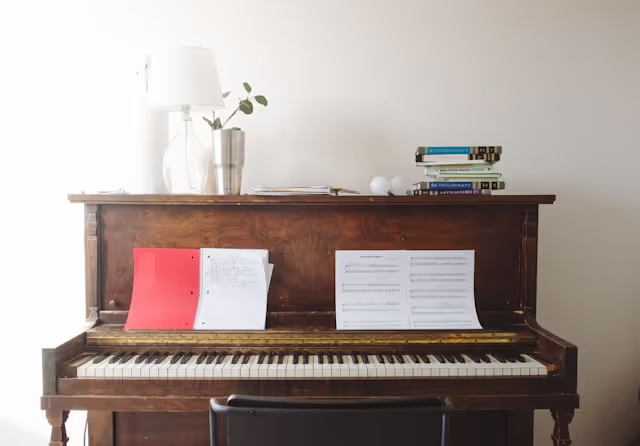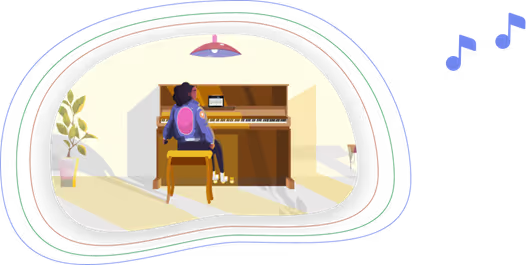Are Most Pianists with a Music Degree Good Sight Readers?
The Truth About Sight Readers in Traditional Music Education
Sight reading is often considered a fundamental skill for pianists pursuing a music degree. But are most professional pianists actually good sight readers? The short answer: yes, but they had to endure years of grueling sight reading exercises, sight reading books, and a traditional approach to sheet music that makes learning slow and difficult.
In most music education programs, sight reading is taught alongside repertoire, rather than as the primary learning method. This means students first memorize pieces, then struggle to sight read unfamiliar sheet music. But what if the process was reversed?
That’s where MuseFlow revolutionizes the way pianists learn, making piano sight reading practice the first thing you tackle, allowing students to develop their sight reading ability faster, retain more information more effectively, and apply their skills directly to repertoire.

Why Sight Reading is a Challenge for Many Music Students
Many pianists enter college with varying levels of sight reading ability, depending on their early training. While some conservatory-level musicians can sight read orchestral reductions with ease, others still struggle with unfamiliar notes read in real-time.
The traditional music education model emphasizes memorization, performance, and interpretation before fluency in sight reading exercises. Students often rely on:
- Sight reading books filled with limited graded etudes
- Sheet music collections designed for slow, deliberate practice
- Repetitive sight reading exercises that lack real-world musical context
This method works.. eventually... but it takes years of sight reading practice piano training under immense pressure. MuseFlow, on the other hand, lets you optimize the level of difficulty yourself, ensuring that students start from where their skill meets the challenge, and progress through sight reading free of unnecessary frustration or boredom.
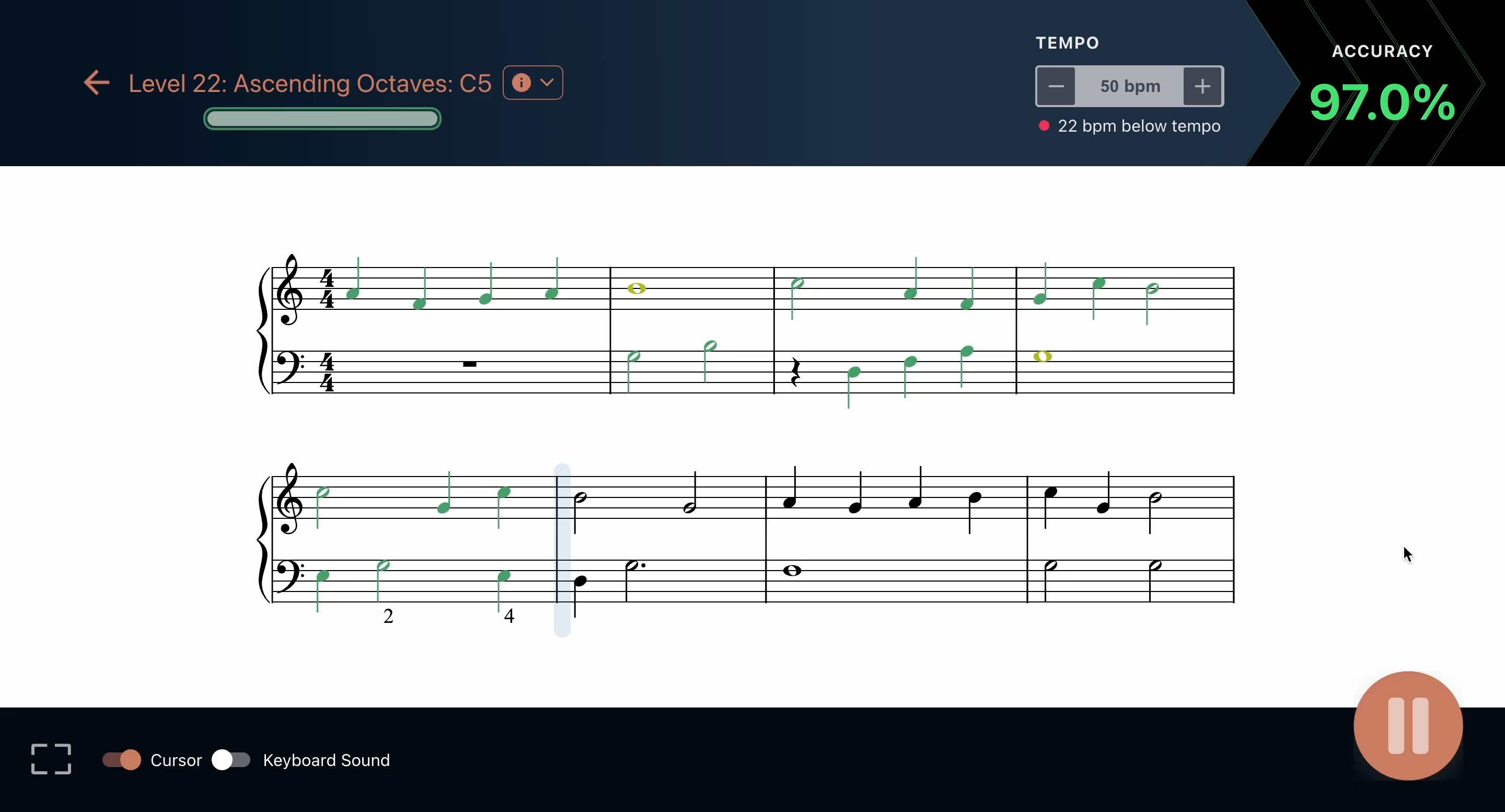
How Do Most Music Degree Holders Develop Their Sight Reading Ability?
Pianists with formal degrees typically develop their sight reading ability through:
1. Constant Exposure to Sheet Music
Music majors must quickly absorb new pieces because of deadlines. They rehearse for hours and hours, just perfecting one piece that the’ll have to perform for a music assignment or ensemble performances. The faster they can read notes and patterns, the better they perform.
2. Sight Reading Exams and Auditions
Music degree programs often test sight reading under pressure. Students must play complex sight reading exercises in front of professors, often with little preparation. Though institutions haven’t adopted an effective way to train sight reading specifically.
3. Learning from Sight Reading Books
A pianist’s bookshelf is filled with sight reading books of increasing level of difficulty, covering everything from simple rhythms to advanced polyphonic textures. Though of course, these texts are limited to the amount of music that is within them.
4. Repetitive Sight Reading Practice Piano Sessions
Repetition is key in music school.. Many pianists spend hours each week on sight reading practice piano drills, gradually improving their ability to play music at first sight. Keywords here are repetition, and gradually. Again, definitely not the most effective method to learn to sight read.
5. Collaborative Playing with Ensembles
Accompanying singers or instrumentalists forces pianists to develop real-time sight reading ability. Mistakes are only partially welcome, and to a point. You need to be sure not to mess up the main performer if you are accompanying them. Yet, this is the most intuitive, effective, and fun way to learn how to sight read.
These methods above are highly effective… but they demand years of rigorous training, are quite time consuming, and highly repetitive, often with high levels of frustration.
MuseFlow accelerates this process by integrating sight reading from the very first lesson, and. by making it the base of the entire curriculum.
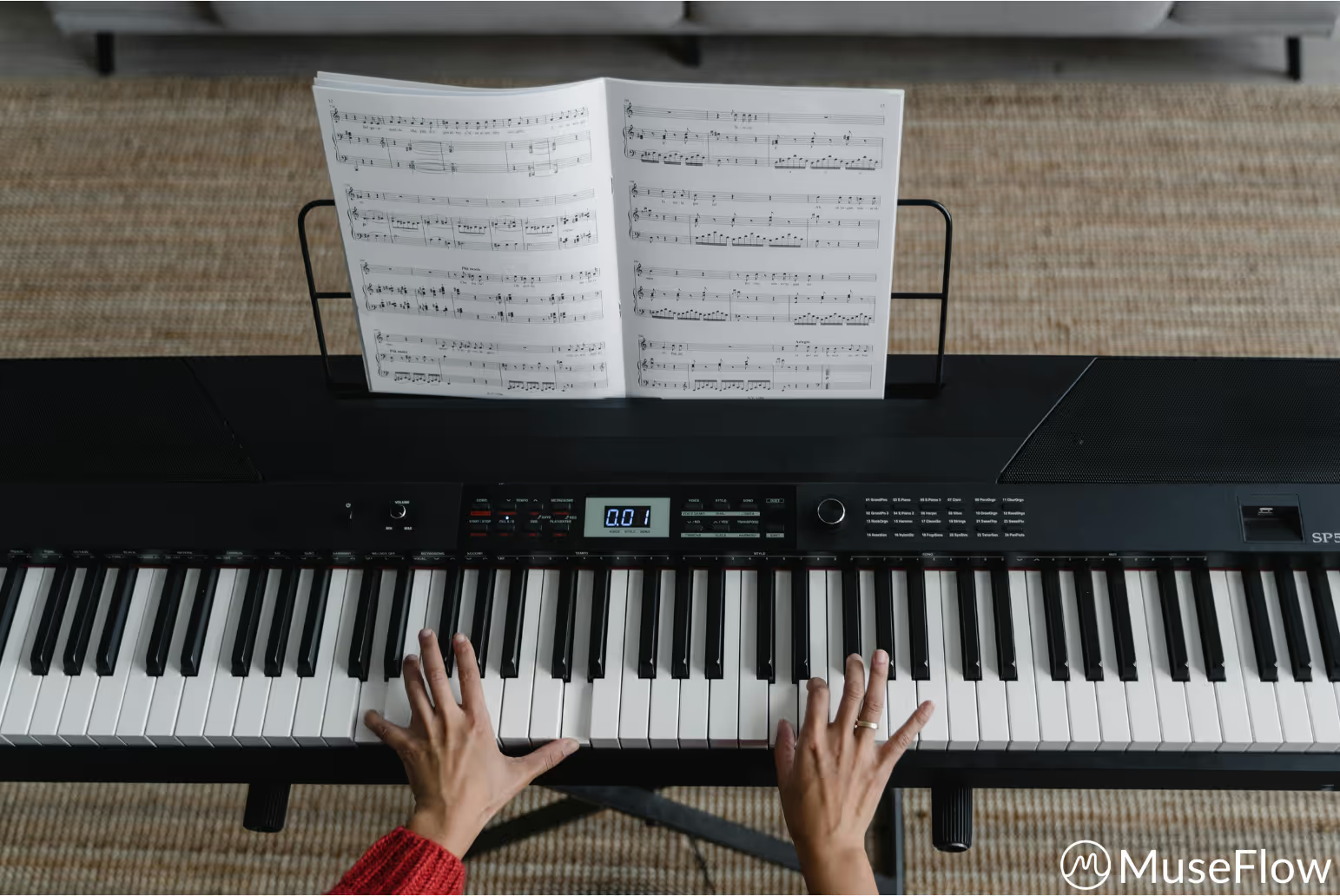
How MuseFlow Makes Sight Reading the Foundation of Learning
Unlike traditional music education, where sight reading exercises are secondary, MuseFlow places sight reading practice for piano, first. Here’s how:
1. Sight Reading as the Engine of Learning
Instead of teaching students to memorize pieces first, MuseFlow guides them to read notes in real-time, reinforcing pattern recognition. Students learn the notes and rhythms for each level through sight reading first, then, once they’ve learned the new skill, songs get unlocked!! At that point, they’ve already learned the new skill well enough to play new songs with those skills in them!! Thus, making it easier, faster, and more fun to learn those new songs.
2. Soft-Unlocked Sight Reading Exercises and Levels
MuseFlow lets users place themselves where their sight reading skill level matches the challenge of a level. Instead of hard-unlocking everything, MuseFlow has every level soft-unlocked, so a user can go in and decide where to start. Unlike static sight reading books, MuseFlow has a full range of never-repeating music in a vast range of levels. Users can place themselves at whatever difficulty matches their skill level, and move up at their own pace, never repeating the same phrase twice.
3. Engaging, Game-Like Practice Instead of Drills
MuseFlow turns sight reading practice for piano into an immersive challenge. No more tedious sight reading books… just continuous improvement through engaging play.
4. Sight Reading → Direct Application to Repertoire
MuseFlow helps students sight read free of fear of failure, and then seamlessly transition to learning pieces they love. Instead of memorizing songs outside of their level first, they develop their sight reading ability first, and then refine their artistry and musicianship in the songs at that level.
5. Faster, Fun, and More Effective Learning
Traditional music education takes years to develop strong sight readers. With MuseFlow, pianists achieve the same level in a fraction of the time, and in a more engaging/gamified way.
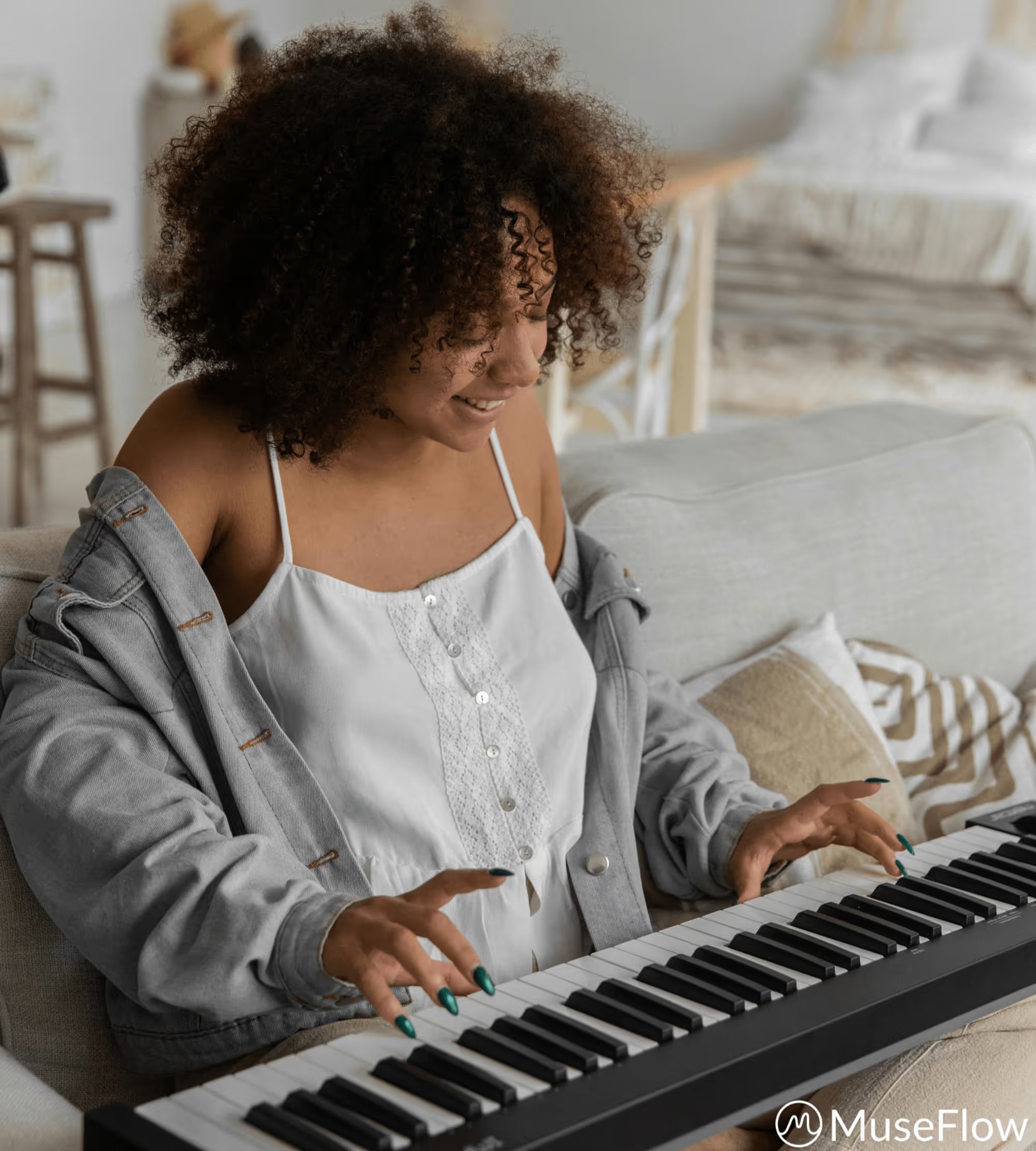
Why Traditional Sight Reading Training is Outdated
Most sight reading books are filled with repetitive, outdated exercises that lack engaging and endless exercises. The typical sight reading practice piano routine involves hours of playing dull etudes that don’t translate into real world music fluency.
By contrast, MuseFlow:
- Makes sight reading practice piano engaging, fun, and intuitive
- Provides sight reading free of unnecessary stress of someone watching over your shoulder
- Lets you pick the level from which to start
- Encourages sight reading ability development through game-play
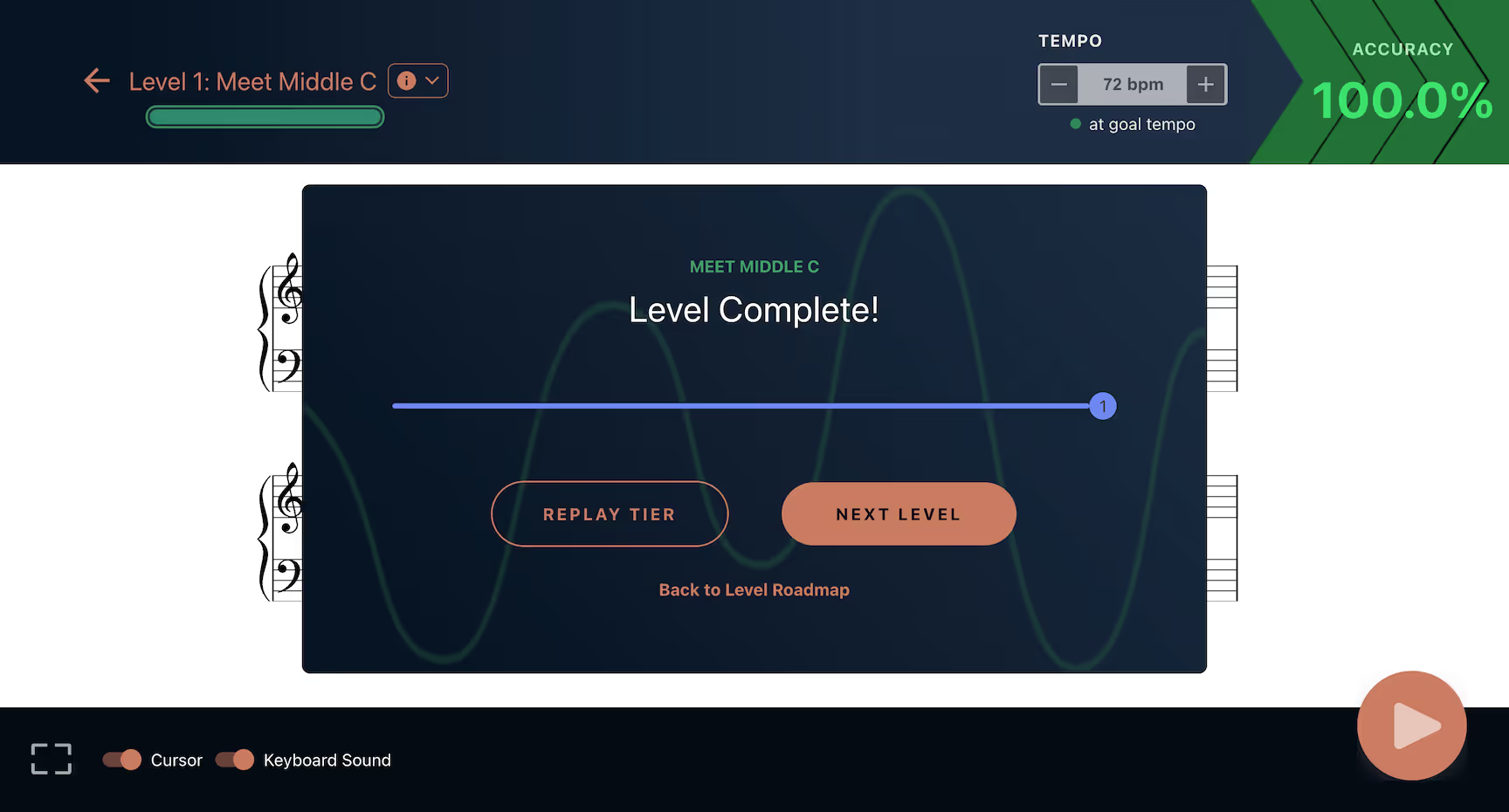
Conclusion: Yes, Most Music Degree Holders Are Good Sight Readers… But MuseFlow Gets You There Faster
Most pianists with a music degree develop their sight reading ability, but they do so through years of difficult training. MuseFlow makes it possible to reach the same level.. without the years, and without the frustration.
By reversing the music education process and making sight reading the foundation of learning, MuseFlow helps students:
✔️ Learn sheet music for the songs they love faster and with more fun
✔️ Improve their ability to read notes in real-time
✔️ Skip outdated sight reading books and use personalized, never-repeating sheet music
✔️ Achieve advanced sight reading ability through natural, intuitive practice
Want to accelerate your sight reading practice piano training? Start learning the fun way with MuseFlow today!

.svg)

.jpg)

